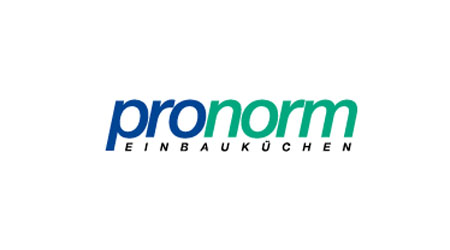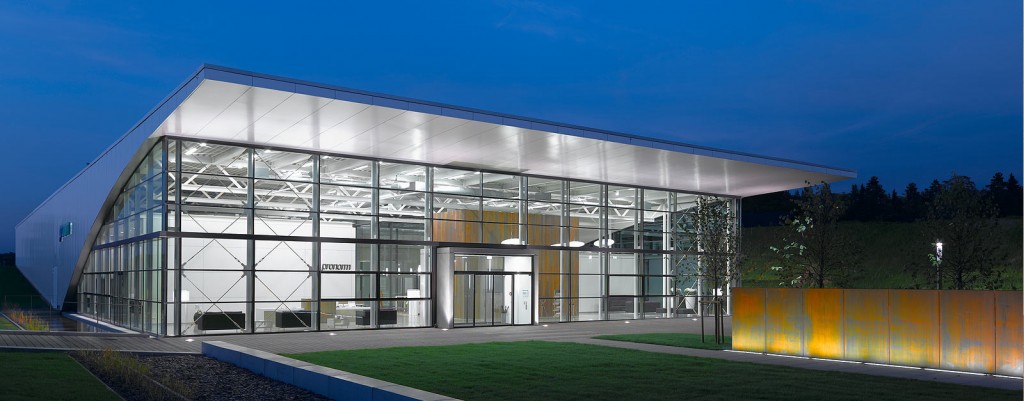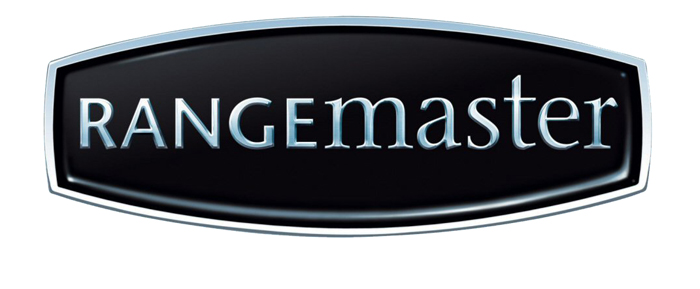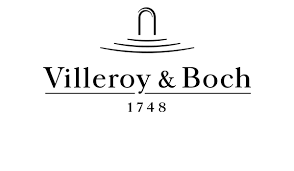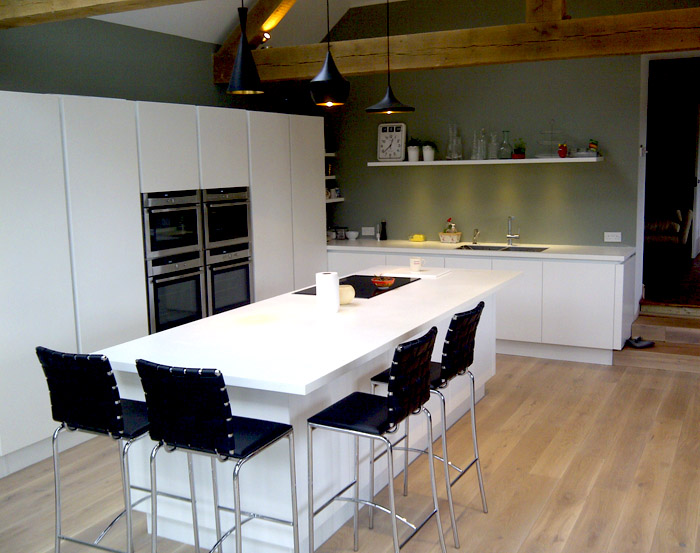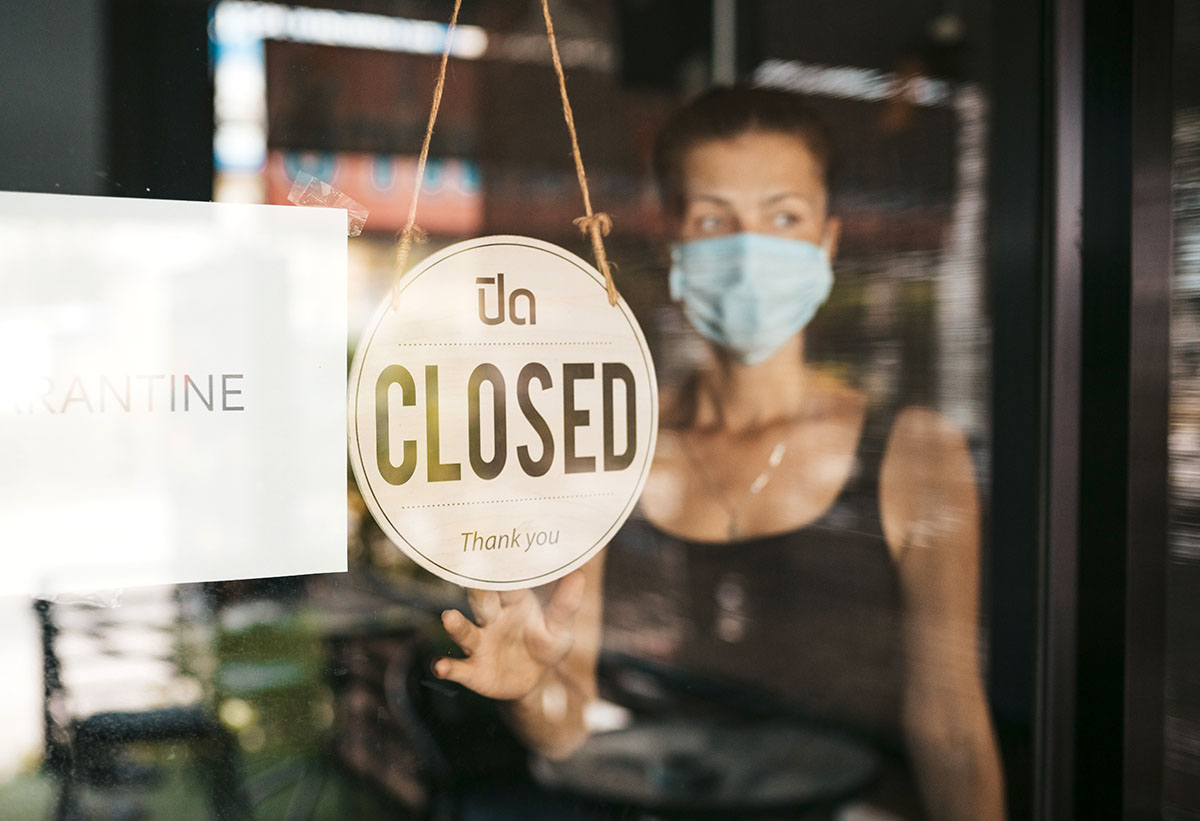After its takeover by DMG in March 2010, German kitchen manufacturer Pronorm has seen some dramatic changes with a sizeable investment and profits to boot. From the spa town of Bad Salzuflen, Germany, Pronorm’s UK and Ireland business manager Jason Grinton talks about the company’s recent success…
Pronorm has seen an eventful few years and this year has been no exception. In February 2010, Pronorm’s parent group Nobia sold the company to Dutch kitchen specialist De Mandemakers (DMG), which took over in March of that year. Since then, DMG has invested a sizeable sum into the German company with much of it spent on improving efficiency, a brand new showroom and introducing Pronorm’s handle-less kitchens, Y-Line.
“There were three main things that DMG did when they took over,” Pronorm’s UK and Ireland business manager Jason Grinton enthuses. “We were told we needed handle-less kitchens, a new showroom and some new machinery to increase productivity.” Within a year of DMG taking over, the company had built a new factory and soon after that, the new showroom had its new handle-less kitchen. Grinton explains: “DMG took over in the March and we had our handle-less kitchen on the market four months later.”
“It’s been quite a big cultural change. The Germans tend to think about things for a while before acting. The Dutch just want to get it done.” Since the takeover, Pronorm has continued to see growth with more retailers taking on the brand in Europe and has seen success with the brand’s new ranges, Y-Line and Compact Line.
Grinton explains: “Last year, when we launched Y-Line and Compact Line, it had an immediate impact on our figures, and growth increased by 20%. This year has started well and we have a number of new dealers coming on board and a number of contracts, so I’m anticipating 15 to 20% growth this year, providing things stay the same as they are now.”
The business manager attributes the success to the new showroom – next to the new company factory – saying that it gives the company more credibility.
“By bringing our dealers here and by investing in them, they can be inspired. It’s something that’s underestimated. The benefits to us are huge. In cementing the relationship we have with our retailers, they’ll feel like it’s not a case of us just selling to them, it’s about the whole process, from the chipboard, to them selling the end product. We introduce new ranges every year and we will bring most of our dealership out here. It gives us more credibility.”
The showroom certainly has a wow factor. Finished in just a year, it features well thought-out displays of each of Pronorm’s ranges, with a central seating area worked into the design of the showroom, especially for the company’s dealers and guests.
But Grinton admits that the volume of dealers isn’t everything, citing quality over quantity. “Instead of us opening on every street corner, we want to have a dealership across the country that is balanced,” he says. “There’s no point having dealers that are competing with each other. Others do and we could sell more kitchens, but there’s no point. Exclusivity is a big thing for us. I think it’s one of the things that sets us apart.”
However, in a difficult economic climate and in a crowded kitchen market, the company says that it can be difficult to get new retailers on board. Grinton explains: “It’s a case of better the devil you know than the devil you don’t. It’s very difficult to get people to change, but you must get them early when they’re first coming into the industry.”
But the company continues to see geographical growth in the UK despite tough conditions: “In the Midlands, we have more dealers, so we’re starting to make an impact there. London is definitely waking up for us and that market is always important. In Scotland, we’ve always had a strong market and it’s because we have good dealers.”
There have also been some unexpected areas of growth for the firm with Gibraltar and Northern Ireland, which have been a little surprising, but southern Ireland is still really struggling. Grinton says this growth is not only to do with appreciating the company’s dealers, but also about how the company works with its retailers and tries to offer something different. “We launch new products every year. In September it was 14 or 15 ranges, something that sets the German industry apart from the others. There is a constant change, and update and review of the product.”
Last year Pronorm said that a key aim was to take a bigger market share from the German kitchen manufacturers currently supplying in the UK. Apparently, this has happened and against the current climate. "There was a 10% net decrease of German manufacturers importing into the UK last year, but ours has risen by 20%, so we have taken market share. It’s still a relatively small percentage, but nevertheless we are going against the trend.”
But Pronorm does not underestimate the power of the retailer, Grinton says: “We need strong dealers – they are the people who are going to sell our product to the end consumer. They have to be on board with what we do. We don’t own our own showrooms, so to an extent we’re relying on people that we can support and train, so they understand what we’re trying to do and they become part of the family. The strong partnership is undoubtedly one of our strengths.”
Pronorm also insists on a certain amount of display space in its retailers’ showrooms to make it worth the company’s while. “For example, in London,” says Grinton, “in a small studio, it’s no use saying you want them to display five kitchens. “We would say we wanted to be the only German manufacturer and we’d want 50% of the showroom space. If it was a relatively large showroom, we’d ask for three kitchens or three displays.”
And are there signs of a recovery for the KBB market in the UK? Grinton is philosophical on this subject.
“I’m not seeing a recovery. I still think it’s bad. If you were to go into most of our dealers and ask what the market was like, they would say ‘awful’. Our growth has come from taking from other people and taking from English manufacturers.
“I think it will get better, but it won’t get much better this year. I think if there’s anything that might give an indication, there is more contract business starting to come and that’s normally an indication of things starting to pick up again. But, the banks aren’t lending and we don’t sell kitchens to people who go to the bank and borrow money and have a mortgage. It used to happen, but it doesn’t happen now.”
So, despite Pronorm’s success of late, does the company’s business manager think there are any areas where Pronorm can improve? “Always,” says Grinton. “You’ve got to keep going with new developments, new front styles. You can’t stand still because the industry is constantly evolving. We have a few internal things we are going to do, such as investing in machinery to improve efficiency, investing in IT to make our order confirmation system better, and a CAD system that will allow us to plan every order and generate a confirmation from that. That will bring us up to speed with our competitors – there’s a list of things and it depends how we prioritise.”
But, he concludes: “We’re one of the few companies that are moving forward, rather than standing still.”
The above interview was given to KBB Review, the Kitchen, Bedroom and Bathroom Trade Body
Pronorm Company history
The traditional company pronorm can look back over a long company history. It already began production back in 1945 of high quality kitchen furniture at its location in Vlotho. 1972 then saw introduction of the current name of the company: pronorm. Pronorm can be counted today amongst the leading manufacturers of high quality kitchen lines which cater for both the middle and the upmarket segments.
Pronorm Philosophy
Kitchen dreams are coming true Every desire in the kitchen is individual and unusual. Therefore the perfect kitchen is exactly that which matches your very personal needs and habits. Experience the many options offered by modern kitchen layouts, from small kitchen spaces and dreams over comfortable space planning for the whole family through to exclusive design highlights: everything is possible. This can be done, also with the highest degree of individuality, in an unusual design and with intelligent equipment details. This is how kitchen dreams can come true!
Pronorm and the Environment
One task which has been achieved in an excellent way in sense of the word apart from quality is environmental protection. This is why pronorm was awarded certification according to DIN EN ISO 14001 and EAMS II. Based on environmentally friendly production as part of a continuous improvement process, pronorm is following the objective to reduce use of resources and energy as well as to reduce noise pollution and production of waste.
